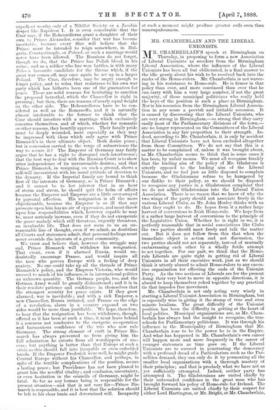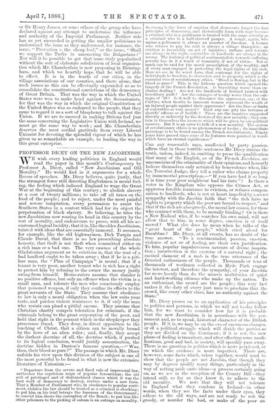MR CHAMBERLAIN AND THE LIBERAL lTNIONISTS.
MR. CHAMBERLAIN'S speech at Birmingham on Thursday, in proposing to form a new Association of Liberal Unionists as seceders from the Birmingham Liberal Association, where the influence of the Liberal Unionists has been all but obliterated, is a final answer to the idle gossip about his wish to be received back into the ranks of the Home-rulers. Mr. Chamberlain is not waver- ing in his resistance to Home-rule. He is firmer in that policy than ever, and more convinced than ever that he can carry with him a very large number, if not the great majority, of those municipal politicians who really hold the keys of the position in such a place as Birmingham. Nor is his secession from the Birmingham Liberal Associa- tion in any sense a peevish and irritable secession. It is caused by discovering that the Liberal Unionists, who are very strong in Birmingham,—so strong that they carry easily most of the Parliamentary divisions of the town,— are no longer represented on the Committees of the Liberal Association in any fair proportion to their strength. In- deed, according to Mr. Chamberlain, it is only by accident that Liberal Unionists have not been excluded altogether from those Committees. We do not say that this is a matter to be complained of, unless it was brought about, as Mr. Chamberlain seems to think that in some cases it has been, by unfair means. We must all recognise frankly that the leading aim of the policy of Mr. Gladstone is utterly opposed to the leading aim of the Liberal Unionists, and we feel just as little disposed to complain because the Gladstonians refuse to be hampered by our dislike to their policy, as we should be disposed to recognise any justice in a Gladstonian complaint that we do not admit Gladstonians into the Liberal Union Association. There is no reason that we know of why the two wings of the party should not associate freely in the various Liberal Clubs, as Mr. John Morley thinks with us that they ought to do. He hopes from it a rather large harvest of conversions to Irish Home-rule. We hope from it a rather large harvest of conversions to the principle of the Legislative Union. Whether he is right or we, it is perfectly reasonable that in social associations like Clubs the two parties should meet freely and talk the matter out. But it does not follow from this that when the immediate object is action and not discussion, the two parties should not act separately, instead of mutually embarrassing each other by a wholly futile attempt to act together. For our part, we think that the Home- rule Liberals are quite right in getting rid of Liberal Unionists in all their executive work, just as we should think it utterly absurd to admit Home-rulers to any execu- tive organisation for effecting the ends of the Unionist Party. As the two sections of Liberals are for the present doing their very best to move in opposite directions, it is absurd to keep themselves yoked together by any practical tie that impedes free movement.
Mr. Chamberlain is not only acting very wisely in starting a Liberal Unionist Association in Birmingham, but is especially wise in giving it the stamp of true and. even minute localism. The great difficulty of the Unionist position has been the difficulty in getting at the heart of local politics. Municipal organisations are, as Mr. Cham- berlain has always had the insight to recognise, the true schools for Parliamentary politicians. It was through his influence in the Municipality of Birmingham that Mr. Chamberlain rose to be the power he is in the Empire. And what has happened in Mr. Chamberlain's own career will happen more and more frequently in the career of younger statesmen as time goes on. If the Liberal Unionists are to succeed in penetrating the democracy with a profound dread of a Particularism such as the Par- nellites demand, they can only do it by permeating all the smaller local organisations with a thorough mastery of their principles ; and that is precisely what we have not as yet sufficiently attempted. Indeed, neither party has attempted it. The Gladstonians are united chiefly by their unbounded confidence in the great man who has brought forward his policy of Home-rule for Ireland. The Liberal Unionists are united chiefly by their respect for either Lord Hartington, or Mr. Bright, or Mr Chamberlain, or Sir Henry James, or some others of the group who have declared against any attempt to undermine the influence and authority of the Imperial Parliament. Neither side has as yet succeeded in getting the smaller politicians to understand the issue as they understood, for instance, the issue, "Protection v. the cheap loaf," or the issue, "Shall we support the Turks in massacring the Bulgarians ?" Nor will it be possible to get that issue truly popularised without the sort of elaborate subdivision of local organisa- tion which Mr. Chamberlain is now proposing in Birming- ham, and which we heartily hope that he will be able to effect. It is in the wards of our cities, in the village associations of our counties, and there alone, that such issues as this can be effectually expounded so as to consolidate the constitutional convictions of the democracy of Great Britain. That was the way in which the United States were won to make head against the Secessionists, for that was the way in which the original Constitution of the United States was so endeared to the people, that they came to regard it as a sort of blasphemy to talk against the Union. If we are to succeed in making Britons feel just the same concerning the Legislative Union with Ireland, we must go the same way to work ; and Mr. Chamberlain deserves the most cordial gratitude from every Liberal Unionist for devoting the splendid vigour of which he has given us so remarkable an example, to leading the way in this great enterprise.



































 Previous page
Previous page